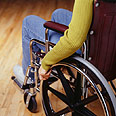
Disability not a tragedy
Op-ed: Instead of giving up on disabled kids, society should celebrate their achievements
How many times have we heard that a child has been born without the ability to walk, or with a physical defect, and he or she is written off, even before receiving a name? The reactions come fast and furious, involving words like "shame," "horrible" and yes, even "tragedy."
Tragedy? How can the birth of a "normal" child be a miracle, but the birth of a child with a disability is seen as a tragedy?
And that's not the only example.
A soldier loses sight while defending his country and his future potential is written off by his friends. A difficult birth results in certain mental challenges for the child, and the parents give up even before they begin parenting.
As someone who works closely with such children, day in and day out, I have a call to action: Let's calibrate.
To be sure, there are tragedies in this world. Hurricane Sandy and the Newtown massacre were tragedies. Stories about children dying due to parental negligence are tragedies.
But the above examples of the baby, the soldier and the difficult birth are not tragedies. Quite the opposite. I see each of those as an inspiring and uplifting success story in the making.
What is it that leads us to consider disability to be tragic? Is it our societal obsession with physical looks? Our need to be the fastest, the strongest, the richest?
Let's calibrate.
The real tragedy
I have a friend who has taken it upon himself to train to run a marathon. It will be his first marathon, and he's committed several months to get himself in shape for the big race. He is in the shape of his life, and when he crosses the finish line, it will be the fulfillment of a dream he's had since he was a five year-old child.
But he won't win the race. Someone else will have that honor, someone more capable. And if that's the case – that my friend will not win, but he nonetheless considers finishing this marathon to be an achievement – isn't it so?
And if that is the case, why can't we apply the same standards of achievement to disabled children (and adults)? Why can’t we applaud a severely disabled nine year-old child who – through hard work and determination – is able to lift a spoon to his mouth successfully for the very first time? Why can't we applaud the teenage girl who – through hard work and determination – finds a way to complete a puzzle designed for a three year-old?
I believe our society should celebrate these achievements the same way we celebrate a grown man running a marathon at a speed that many world-class runners would consider unimpressive.
Week after week at ALEH, I see children do things they've never been able to do – and that many thought they would ever be able to do – because we believe in them, and we believe that everyone, yes everyone, deserves to have the opportunity to achieve. And if we have to adjust our expectations, based on the relative abilities of the severely disabled, then so be it.
I grew up in an environment where we were told that "you can do anything you want, if you try hard enough, and if you want it badly enough." Why are the rules different for those who are disabled? Why don’t they get to dream? Why don't they receive what I believe is the unalienable right to having achievable goals?
Why are they written off?
That is the real tragedy.
We have all, whether directly or indirectly, over the past year, grown to understand that tragedies do take place in this world. We have seen the pain and the tears, yet we haven't yet understood that, given how painful tragedies are, we must be clear on what qualifies and what does not.
So, we must calibrate, and appreciate that disability is not a tragedy.
It is only tragic when one considers disability to be the end of the potential for achievement.
Dov Hirth is the director of marketing and development for ALEH (www.aleh.org), which celebrates its 30th anniversary this year. ALEH provides over 650 children from around Israel with high-level medical and rehabilitative care in an effort to help them reach their greatest potentials.










